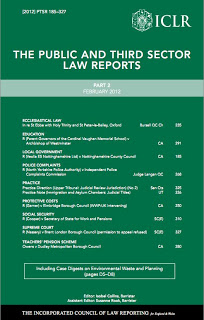What do a 13th century elm coffer, the Audit Commission Act 1998 and debt relief orders have in common?
Guest post by Isobel Collins, Editor of the Public and Third Sector Law Reports
They can all be found in the February part of The Public and Third Sector Law Reports.
 Some of you may be familiar with the bags of brightly coloured sweets containing liquorice and coconut that were popular in my childhood. Each sweet was different but delicious in its own individual way. This month’s PTSR contains a similarly varied assortment of public and ecclesiastical law cases for specialist lawyers to savour and (metaphorically) chew on. Three of them are particularly worthy of mention.
Some of you may be familiar with the bags of brightly coloured sweets containing liquorice and coconut that were popular in my childhood. Each sweet was different but delicious in its own individual way. This month’s PTSR contains a similarly varied assortment of public and ecclesiastical law cases for specialist lawyers to savour and (metaphorically) chew on. Three of them are particularly worthy of mention.
In re St Ebbe with Holy Trinity and St Peter-le-Bailey, Oxford [2012] PTSR 235 will be of particular interest to ecclesiastical lawyers. It is a cautionary tale of a church’s forgotten treasure: a pair of wooden chests, one a rare 13th century elm coffer, “sold” at auction without the necessary authorisation and further “sold” on. Rupert Bursell QC Ch reminds us that a faculty (permission) is required for the lawful disposal of church property (which belongs to the parishioners). Serious and important consequences followed, since without such a faculty “no legal ownership … passed to any subsequent possessors.” Quoting Halsbury’s Laws of England, the chancellor emphasises that “ecclesiastical law … is as much part of the law of the land as any other part of the law.” Those “who acquire goods which clearly come from a church and in particular dealers in the antique trade … should take steps to satisfy themselves that those responsible for selling goods … had authority to do so.” (See In re St Mary’s, Barton-upon-Humber [1987] Fam 41, 56.) That reminder, says the chancellor, applies equally to auctioneers.
R (Veolia ES Nottinghamshire Ltd) v Nottinghamshire County Council [2012] PTSR 185 concerns the important balance between the right of “persons interested” to inspect a council’s accounts under section 15(1) of the Audit Commission Act 1998 and the right of those who contract with councils to protect their confidential, commercially sensitive information. Cranston J [2010] PTSR 797 had permitted an elector to inspect and copy documents relating to a waste management PFI contract between the claimant company and the council, notwithstanding that that would result in a breach of commercial confidentiality. The Court of Appeal holds, in effect, that disclosure of documents falling within section 15 of the 1998 Act can be restricted in order to protect valuable commercial confidential information, where disclosure would unjustifiably infringe the rights of the owner to the peaceful enjoyment of his possessions under article 1 of the First Protocol to the Convention for the Protection of Human Rights and Fundamental Freedoms. In relation to the documents in issue before Cranston J, disclosure of confidential information had already taken place, but the Court of Appeal’s ruling applied to other documents, not before the judge at first instance, for which inspection had subsequently been sought.
R (Cooper) v Secretary of State for Work and Pensions [2012] PTSR 310 asks whether, during the moratorium period of a debt relief order, the Secretary of State can continue to recoup by deduction from that person’s current benefit payments an overpayment of benefit or social fund loan that is included in the qualifying debt. The Supreme Court says not. Recovery by the creditor of the overpayment or loan is a “remedy in respect of the debt” precluded by section 251G(2) of the Insolvency Act 1986, as amended, during the moratorium period, and thereafter (subject to certain exceptions) the qualifying debts are discharged. Moreover, the court did not see;
“Any reason to distinguish between the DRO scheme and bankruptcy in this respect … The Secretary of State loses the power to recoup overpayments and social fund loans on the making of a bankruptcy order just as he does on the making of a DRO” (see eg para 23).
As the court says, it must be for the Government to consider whether to achieve a different result by amending legislation.
The editor, PTSR